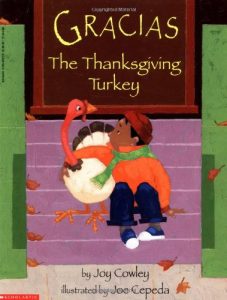 In this warm holiday story, a young Puerto Rican boy saves the life of his pet turkey with help from his close-knit New York City family and neighborhood. Beginning Spanish vocabulary is woven into the text. Four color.
In this warm holiday story, a young Puerto Rican boy saves the life of his pet turkey with help from his close-knit New York City family and neighborhood. Beginning Spanish vocabulary is woven into the text. Four color.
United States
Materials from United States of America
Big Enough/Bastante grande
Mamá always sighs, “Muy, muy chica,” every time Lupita tries to help out at the restaurant that Mamá runs all by herself. But when push comes to shove–or when Grabb comes to swipe–everyone in this exciting tale discovers that, although Lupita may be too little for some tasks, she is big enough for others.
Blood Secret

A story of secrets and shadows by a Newbery Honor author.
When Jerry Moon is sent to live with her great–great–aunt, she discovers a trunk in the basement that reveals dark mysteries about her family’s ancestry. Newbery Honor author Kathryn Lasky brings a dramatic and rarely–portrayed period of history to life in this powerful coming–of–age tale that weaves together the Spanish Inquisition, Jewish belief, and a girl learning to understand her past.
Ages 12+
Call Me Henri
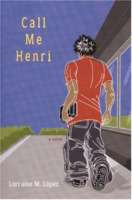
Enrique, a young boy in Peralta Middle School, faces abuse at home and danger on the barrio streets. Yet he is driven to succeed by the desire to join that “other America” he sees on TV and in the movies, and is aided in his quest by compassionate teachers. His ambition finds expression in his determination to drop his ESL class in favor of taking French, and his story begins, “Call me Henr.”
Lorraine Lpez (author of Soy la Avon Lady and Other Stories) has created a vivid picture of barrio life, filled with honesty, insight, and humor for young adults. She paints a balanced and detailed landscape of Enrique’s world. Although Enrique is confused and angered by his mother’s refusal to stand up for him against the abuse of his stepfather, he also draws strength from the supportive and loving family of his friend Francisco. While some of his teachers are uncaring or inept, others provide help and encouragement at critical moments in his life.
When Enrique witnesses his friend Horacio gunned down in a drive-by shooting and is seen by the assailants, gang members set out to kill him. As the novel reaches its climax, Enrique must make some agonizing decisions.
Although specifically about barrio life, this novel is universal in its themes-the drive for success, the desire for love and family support, and the need for true friendship. Lpez’s fully delineated characters provide a rich and credible mural of our human comedy.
Lorraine Lpez‘s Soy la Avon Lady and Other Stories was selected for the Marmal Prize, and also won the IPPY Award for Multicultural Fiction.
Chicken Foot Farm
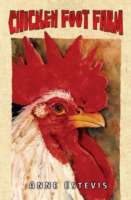
On the eve of World War II, young Alejandro comes of age on his family’s South Texas farm, known as Chicken Foot Farm because of how his mother marks her chicks. “Mama held the chick against her breast and splayed its left foot between her thumb and index finger. With her free hand she… quickly cut off the end of the chick’s shortest toe.” Rich with the customs and traditions of rural, Mexican-American life, Chicken Foot Farm depicts a multi-generational family in flux as change crawls relentlessly toward their land and lifestyle. As the seasons–and loved ones–come and go and misfortunes befall the family, Alejandro learns the lessons of life: the importance of family, honesty, hard work, and compassion. When the kitchen burns down one night, Alejandro feels they have lost something integral to their family unity. But his father promises they will build another kitchen, the new one better than the old. As Abuela Luciana ages, she begins to behave erratically, burning tortillas, forgetting to add water to the beans she is cooking, and even disappearing from the farm. She is certain someone has cursed her–put mal de ojo on her. How can the family cure her when she is the curandera, the one who has always taken care of them? Most importantly, Alejandro works hard to win his father’s approval, even though Papa generally ignores him in favor of the eldest son, Ernesto, who Papa says will inherit the farm. When Ernesto joins the Army, the family must face the possibility that he may not return as the entire country is thrown into the uncertainty of war. Following the attack on Pearl Harbor, young Alejandro notices something new in his family’s kitchen: a framed United States flag now hangs on the wall. “It’s something I can do for the war,” his Abuela Luciana tells him. Not understanding, she explains to him, “I can remind people that we are Americans.” In these poignant images of a time and place long gone, Anne Estevis sketches a tight-knit, Mexican-American community on the cusp of a new way of life as tractors replace mules and modern science competes with superstitious beliefs.
Early Explorations: The 1500s (Hispanic America)
Ellen Ochoa: The First Hispanic Woman Astronaut (Great Hispanics Of Our Time)
Fact Of Life #31
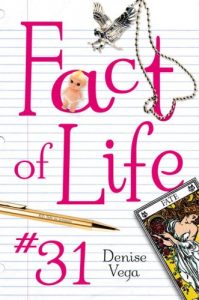 FACT OF LIFE #48: Kat’s mom is No-Last-Name Abra, the best home-birth midwife in Colorado. But with her own daughter, Abra can’t stop teaching and lecturing long enough to be a mom.Fact of Life #21: Kat’s had a crush on Manny Cruz since seventh grade. Now Manny is showing interest , but could he seriously be into Weird Yoga Girl Kat Flynn?Fact of Life #14: Gorgeous Libby Giles has always intimidated Kat. But lately there’s something different about Libby, and it’s about to bring her crashing into Kat’s Life. . . .Hilarious and poignant, this is the story of one girl’s sometimes funny, sometimes painful path to self-acceptance and to finding her place in the world.
FACT OF LIFE #48: Kat’s mom is No-Last-Name Abra, the best home-birth midwife in Colorado. But with her own daughter, Abra can’t stop teaching and lecturing long enough to be a mom.Fact of Life #21: Kat’s had a crush on Manny Cruz since seventh grade. Now Manny is showing interest , but could he seriously be into Weird Yoga Girl Kat Flynn?Fact of Life #14: Gorgeous Libby Giles has always intimidated Kat. But lately there’s something different about Libby, and it’s about to bring her crashing into Kat’s Life. . . .Hilarious and poignant, this is the story of one girl’s sometimes funny, sometimes painful path to self-acceptance and to finding her place in the world.
Fiesta Dress: A Quinceanera Tale
It s the day of Lolo’s big sister’s quinceañera party, and suddenly everyone is too busy to play with Lolo. But when she lets her dog Gobi runfree, everyone notices. Vivid illustrations in acrylics and watercolor by Martha Avile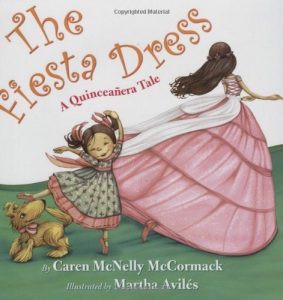 s skillfully portray Lolo using her fast feet and wits to outsmart Gobi and save her big sister’s special day!
s skillfully portray Lolo using her fast feet and wits to outsmart Gobi and save her big sister’s special day!
He Forgot To Say Goodbye

“Ramiro Lopez and Jake Upthegrove don’t appear to have much in common. Ram lives in the Mexican-American working-class barrio of El Paso called “Dizzy Land.” His brother is sinking into a world of drugs, wreaking havoc in their household. Jake is a rich West Side white boy who has developed a problem managing his anger. An only child, he is a misfit in his mother’s shallow and materialistic world. But Ram and Jake do have one thing in common: They are lost boys who have never met their fathers. This sad fact has left both of them undeniably scarred and obsessed with the men who abandoned them. As Jake and Ram overcome their suspicions of each other, they begin to move away from their loner existences and realize that they are capable of reaching out beyond their wounds and the neighborhoods that they grew up in. Their friendship becomes a healing in a world of hurt.


